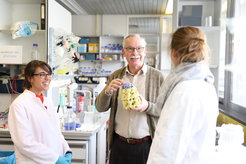Franz-Ulrich Hartl honoured with prestigious science award
F.-Ulrich Hartl, Director at the Max Planck Institute of Biochemistry, receives the BBVA Foundation Frontiers of Knowledge Prize.
The Banco Bilbao Vizcaya Argentaria (BBVA) Foundation has honoured Franz-Ulrich Hartl, Director at the Max Planck Institute of Biochemistry in Martinsried, with the BBVA Foundation Frontiers of Knowledge Prize in the category "Biology and Biomedicine". The biochemist receives the honour together with his colleagues: Arthur Horwich, Kazutoshi Mori and Peter Walter. The scientists unraveled the physiological mechanisms behind protein folding, a fundamental finding to elucidate the origin of multiple diseases and develop new therapeutic strategies. The prize has been awarded in eight categories since 2008 and is endowed with 400,000 euros each.
The BBVA Foundation Frontiers of Knowledge Award in Biology and Biomedicine has gone in this sixteenth edition to F.-Ulrich Hartl, Max Planck Institute of Biochemistry, Martinsried, Arthur Horwich, Yale University, USA, Kazutoshi Mori, Kyoto University, Japan and Peter Walter, Altos Labs and University of California, San Francisco, USA.
Announcement of the 16th Frontiers of Knowledge Award in Biology & Biomedicine
F.-Ulrich Hartl and Arthur Horwich identified the first cellular mechanism that regulates protein folding by describing the role of molecular chaperones. Mori and Walter discovered the mechanism by which cells react to protein misfolding by attempting to repair misfolded proteinsor, if this fails, to ensure their timely degradation. According to the jury, the four prizewinners had opened up a new, fascinating field of research with their two discoveries.
In an interview on the announcement of the prize, F.-Ulrich Hartl explains: "Chaperones are important parts of all of our cells. They help protein molecules to fold into their correct shape. Proteins are long chains of amino acids. In order to fulfill their various functions in the biology of the cell, they need to fold into a well defined three-dimensional pattern." Chaperones prevent proteins from folding incorrectly and assembling into aggregates. "This is important because these aggregates can be toxic to cells and they can induce various diseases, mostly neurodegenerative diseases such as Alzheimer's and Parkinson's disease," says Hartl.
As far as therapeutic applications are concerned, the scientist has two areas in mind: Neurodegenerative diseases and cancer: "If we could activate the molecular chaperones with small molecule drugs, we could perhaps prevent or delay cell death. The other area concerns cancer cells. These cells depend on various proteins that support their growth. These proteins are often highly dependent on molecular chaperones. In this case, we would like to inhibit the molecular chaperones, and perhaps combine this with other chemotherapies."
Franz-Ulrich Hartl has headed the Department of Cellular Biochemistry at the Max Planck Institute of Biochemistry in Martinsried near Munich since 1997. In recent years, he has been honoured with numerous scientific awards. These include the Gottfried Wilhelm Leibniz Prize of the German Research Foundation (DFG), the Albert Lasker Prize for Basic Research in Medicine, the Shaw Prize and the Breakthrough Prize.

About the BBVA Foundation Frontiers of Knowledge Award
The BBVA Foundation Frontiers of Knowledge Awards, funded with 400,000 euros in each of their eight categories, recognize and reward contributions of singular impact in physics and chemistry, mathematics, biology and biomedicine, technology, environmental sciences (climate change, ecology and conservation biology), economics, social sciences, the humanities and music, privileging those that significantly enlarge the stock of knowledge in a discipline, open up new fields, or build bridges between disciplinary areas. The goal of the awards, established in 2008, is to celebrate and promote the value of knowledge as a public good without frontiers, the best instrument to take on the great global challenges of our time and expand the worldviews of each individual. Their eight categories address the knowledge map of the 21st century, from basic knowledge to fields devoted to understanding and interrelating the natural environment by way of closely connected domains such as biology and medicine or economics, information technologies, social sciences and the humanities, and the universal art of music.













